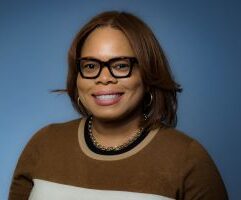The 2025 Learning Conference was more than a gathering—it was a moment to pause, reconnect, and go deeper into the heart of what brings us together: a shared commitment to learning and evaluation as essential practices for navigating change.
When Neeraj Mehta and I were invited last August to co-chair the program committee, we were in the midst of an election cycle that we knew would shape the country’s future. But we hadn’t yet witnessed the full impact of the natural disasters—Hurricane Helene and the devastating wildfires in California—that would soon reshape communities and stretch nonprofit capacity to its limits. We hadn’t yet felt the ripple effects of ongoing market volatility in the philanthropic sector. And we certainly didn’t anticipate the rapid rise of generative AI, which has begun to fundamentally alter how nonprofits operate, communicate, and deliver services—while also surfacing new strategic and ethical questions for funders.
We couldn’t have predicted exactly what the world—or our work—would look like nine months later. But we did know this: we needed to create a conference that was responsive to the moment. Something grounded in the real challenges we all face. That’s why we centered the conference around the concept of Volatility, Uncertainty, Complexity and Ambiguity (VUCA).
While it may sound like just another buzzword, VUCA has its roots in leadership theories developed by the U.S. military to describe the rapidly changing and unpredictable conditions of the post-Cold War world. Since then, it has been widely adopted across sectors—from business to government to social impact work—to help leaders navigate challenging environments. For those of us doing the work—grantmakers, evaluators, and community partners alike—VUCA isn’t a theory; it’s a daily reality. We designed this year’s gathering to be grounded in real-world experience: to learn from people who aren’t just talking about VUCA, but living it, adapting to it, and shaping evaluation practices in the midst of it.
Because the truth is: VUCA conditions can make our work harder. But they also make learning more vital. In these moments of flux, learning becomes our anchor—and evaluation becomes a compass, helping us orient toward what’s next. Not just annually or quarterly—but weekly, daily, sometimes even hourly.
Values in the Midst of Volatility
As adrienne maree brown reminded us in her closing plenary: “Never leave the table from each other.” In times of volatility, when polarization and opposition can feel overwhelming, philanthropy must root itself in relationships—not just transactional ones, but deep, transparent relationships that acknowledge and work through power dynamics. We were challenged to move beyond performative partnerships and toward communities of care—where we not only care for one another but also steward the world we’re co-creating.
Understanding in Times of Uncertainty
When the path ahead is unclear, learning and evaluation offer powerful tools to make meaning. They help us shift from confusion to clarity, from reaction to reflection. Several sessions at the conference explored how organizations under pressure can create space for real-time learning—and how that learning can guide adaptive strategy.
As we planned the conference, we recognized that uncertainty affects every level of an organization, from senior leaders to those just beginning their careers. That’s why it was important not only to equip attendees with tools to continue learning during uncertain times, but also to demonstrate how learning can be a compass to help navigate them.
Courage When Issues—and Solutions—Are Complex
Complex problems rarely come with clear solutions. And yet, funders are often asked to make big bets with imperfect information. At the conference, we heard from leaders who are embracing complexity, not avoiding it—who are using learning to ask better questions, test new approaches, and stay rooted in values even when the answers aren’t simple. The opening plenary anchored attendees by weaving together narratives that hallmarked the beauty, complexity, and resilience of North Carolina. Through the highlighting of three dynamic Carolina women – Hannah Hasan, poet and playwright, Yesenia Cuello, a former child farmworker turned advocate and La’Meshia Whittington, an environmental advocate – we saw courage in action. We saw how they tackle some of our nation’s toughest issues head-on and unapologetically, while centering humanity and the transformative power of narrative to make progress possible.
Action in Times of Ambiguity
Perhaps the most powerful theme of the conference was the reminder that learning and evaluation aren’t passive. They are active, dynamic, and deeply connected to change. One standout example was the partnership between Down Home North Carolina and the Democracy Fund, who worked together to measure the impact of community organizing to expand Medicaid. Their story showed how evaluation can do more than assess outcomes—it can catalyze real-time pivots, foster accountability, and help move from isolated actions to coordinated strategies.
As we move forward from the 2025 Learning Conference, we carry with us more than insights. We carry a renewed commitment to using learning and evaluation not just to measure change—but to make it possible. Whether the ground beneath us is shifting or stable, we believe learning can be our anchor. And evaluation can guide us to the next right move.
With a heart for service that began in childhood and a belief in the power of community, Nalisha Henry’s passion for public service has manifested into an impactful career. Nalisha currently serves as vice president of community impact at United Way of Greenville County (SC). In her role she leads strategy and operations for United Way’s multimillion-dollar portfolio of community investments and initiatives, working to advance equity and upward mobility in Greenville County through collaboration and partnership. Nalisha has been recognized as one of Greenville’s “Best and Brightest” by Greenville Business Magazine, “Young Professional of the Year” by Greenville Chamber, and “Bridge Builder” by Bridges to a Brighter Future at Furman University. Nalisha is a member of Leadership Greenville Class 48, graduate of the Women’s Leadership Institute at Furman University, and 2024 GEO Change Leaders in Philanthropy fellow.

